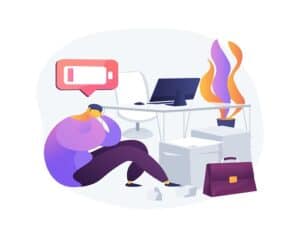
We are in midst of a global pandemic, with healthcare providers on the frontlines struggling to keep up with the needs of patients who are fighting COVID-19. Amid uncertainties, changing guidelines, and intermittent access to personal protective equipment, there have been increasingly burdensome demands placed on healthcare providers all over the world. Even before the pandemic, there existed a growing trend of nurses and doctors experiencing burnout due to the administrative pressures of keeping up with tools like electronic medical records (EMRs) on top of their patient-focused work.
What is Burnout?
Burnout syndrome, known as BOS, refers to the experience of fatigue for extended periods and reduced levels of motivation and interest in the job which leads to decreased job productivity. This is a result of too much effort in the workplace with limited opportunities for recovery. Another definition of burnout is emotional exhaustion from work-related pressure, which can result in physical symptoms.
As the effects of the pandemic continue to take a toll on our daily lives, the extended pressures at work result in healthcare professionals who are susceptible to burnout. Studies demonstrate that burnout in healthcare officials can lead to the following consequences:
- Decreased quality of care for patients.
- Increased risk of making medical errors.
- Reduced patient satisfaction.
- Increased hospital-acquired infections.
- Higher rates of job turnover.
How Mobile Aspects is Helping Hospitals to Reduce Burnout in the Healthcare Industry
There are many ways a hospital can help its employees to minimize the effects of burnout. They must start by arming their staff with the necessary tools to reduce their administrative burden while providing quality care to their patients.
One way that hospitals can reduce the burden on clinicians is to eliminate redundant tasks in the EMR. Automated data capture systems, such as iRISupply from Mobile Aspects, can provide high-quality data by integrating RFID data capture technology directly into your EMR, eliminating the need to have clinicians re-enter supply and implant information into the EMR during hectic procedures. These technologies and many others can help clinicians reduce their administrative headaches to improve job satisfaction. Going from having to enter information manually in 2 or 3 different systems to having a single automated system capture and document all of the information electronically can be a game-changer for clinicians.
Mobile Aspects also has tissue and endoscope management systems that similarly reduce the documentation burden on clinicians. These systems help hospitals to rid themselves of paper logbooks and the files of printed tickets by enabling electronic documentation. These systems are especially helpful in cases of patient safety incidents, which currently require clinicians to pore over reams of logbooks or paper tickets during their investigations. Moving to an electronic system where data can be searched in seconds, rather than in hours or days, can be especially helpful for reducing clinician burnout.
We take great pride in our ability to provide a unique experience for our customers that delivers on our promise to help hospitals improve their operational efficiency and increase patient safety. We look forward to helping our hospital customers in these difficult times and do our best to improve staff morale with our products.
